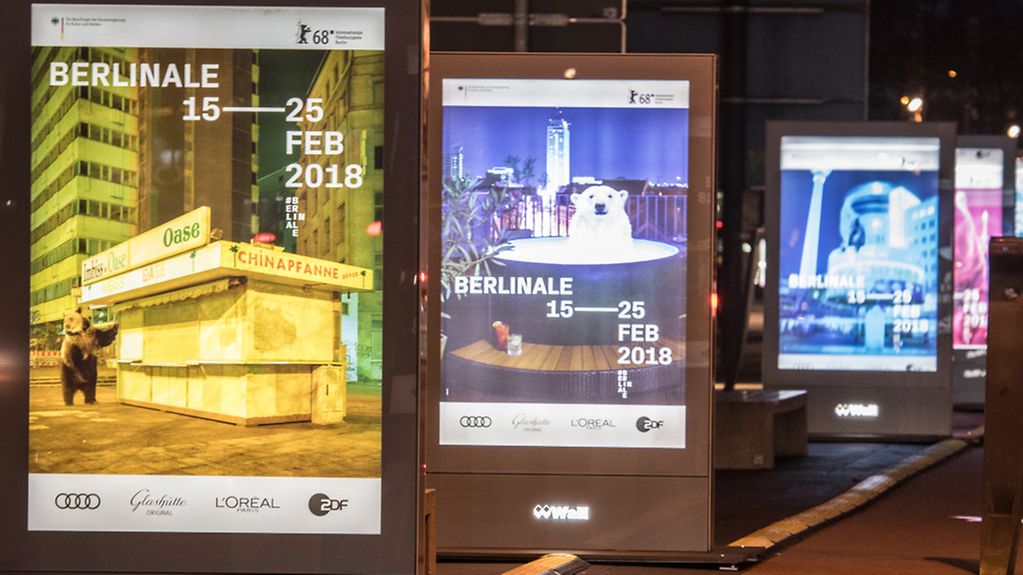68th Berlin International Film Festival
385 films in ten days and half a million film fans – Thursday will see the start of the Berlinale. The 19 films in the competition include four German productions. This year’s Berlin International Film Festival is taking place under the influence of the 'MeToo' debate.
3 min reading time

The bears are back in town - the 68th Berlinale begins on Thursday
Photo: picture alliance / Paul Zinken/dpa
Federal Government Commissioner for Culture and the Media Monika Grütters is supporting a point of contact for victims of abuse in the creative sector.
With more than 500,000 visitors, the Berlinale is the world’s largest film festival that is open to the public. For the first time this year the festival will kick off with an animated film: the world premiere of "Isle of Dogs", the latest work of the American film maker Wes Anderson, whose "Grand Budapest Hotel" won four Oscars and a Silver Bear.
The actors Bill Murray, Tilda Swinton and Isabelle Huppert are only some of the big names expected, along with the British singer-songwriter Ed Sheeran. Murray Cummings’ documentary "Songwriter" gives an intimate insight into how Sheeran lives and works, and his emotional world.
Four German entries
A total of 385 films will be screened. Visitors can explore how film makers see the world in a number of different categories. This year, 19 films are competing for the Golden and Silver Bears. Four of them are German productions.
In "Transit" Christian Petzold tells the story of a writer in exile, fleeing the German Wehrmacht. It is based on a novel by Anna Seghers. In "3 Tage in Quiberon" (3 days in Quiberon) Emily Atef offers a portrait of Romy Schneider during her stay in Brittany. Thomas Stuber’s tender love story "In den Gängen" (In the aisles) and Phillip Gröning’s "Mein Bruder heißt Robert und ist ein Idiot" (My brother’s name is Robert and he is an idiot) are the two other German films in the competition.
#MeToo casts its shadow
The focus is, of course, on the fight for the treasured Golden and Silver Bears, but this year sexual abuse in the film industry and other parts of the cultural sector is also a major issue. Under the banner "Nein zur Diskriminierung/No to Discrimination" counselling services are available free of charge.
In one panel discussion, for instance, Thomas Bellut, director general of Germany’s public broadcaster ZDF and the actress and musician Jasmin Tabatabai will discuss ways of preventing sexual harassment. At a seminar, the initiative "Speak Up!" will be presented. It aims to be the mouthpiece of those in the film branch who have been victims of sexual harassment or abuse.
Federal Government Commissioner for Culture and the Media Monika Grüttersintends to finance a contact point for victims of abuse in the creative sector."Victims need a safe space in which they can talk openly, anonymously and without fear of adverse consequences, and where they can obtain advice, also legal advice," she said, pledging support before the Berlinale. "Power relations between those who place the orders and cast roles and those who need the orders and the roles are asymmetric."
Honorary Golden Bear for Willem Dafoe
The international jury, headed by director Tom Tykwer decides which films will receive the awards on 24 February at the Berlinale. One prize-winner has already been announced though - Willem Dafoe. The American actor is to be awarded an Honorary Golden Bear for his life work.
The actor, who has worked with the world’s top directors has been part of the Berlinale competition on several occasions. He has also attended the Festival as a guest of the international jury.
The International Film Festival in Berlin receives funding of about 7.7 million euros from the budget of the Federal Government Commissioner for Culture and the Media.